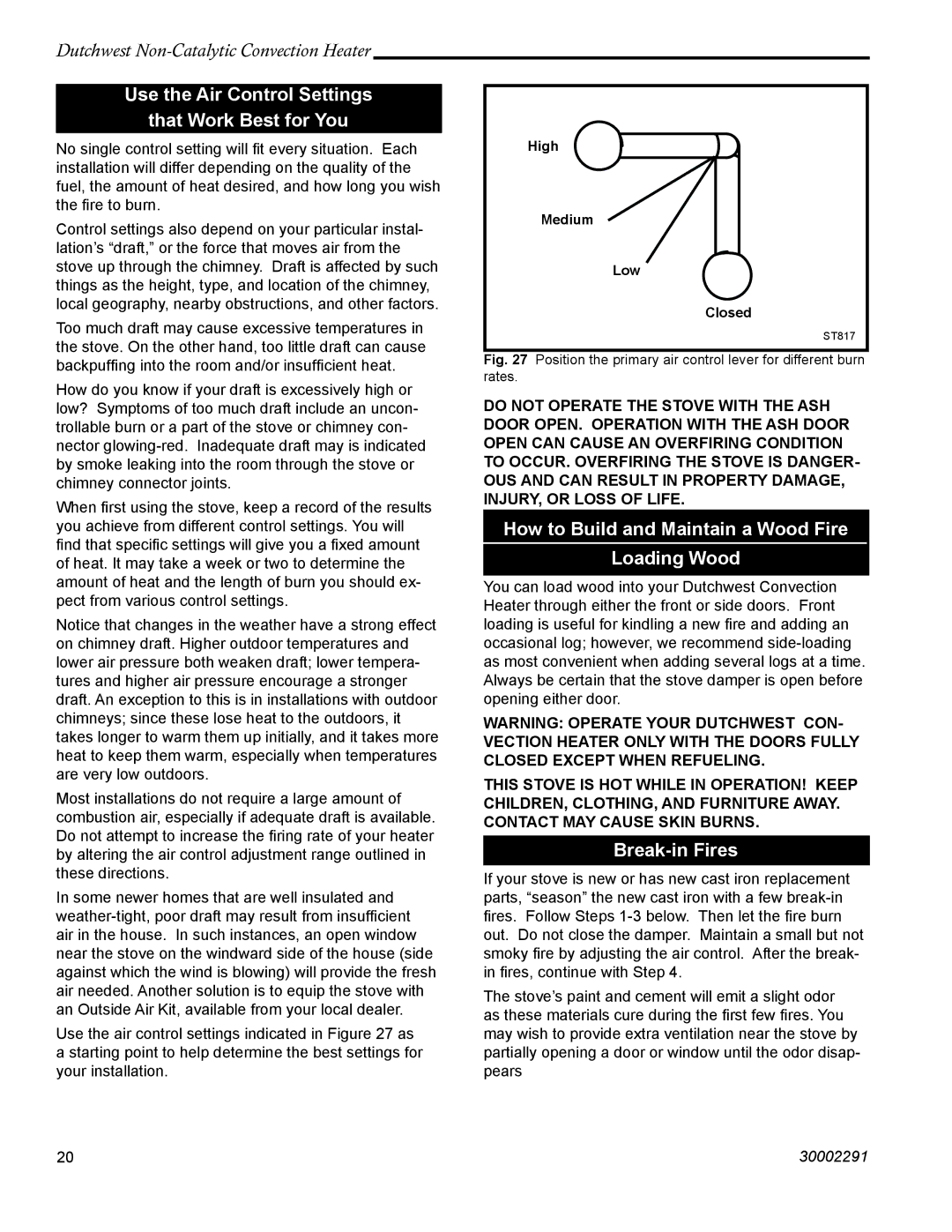
Dutchwest
Use the Air Control Settings
that Work Best for You
No single control setting will fit every situation. Each installation will differ depending on the quality of the fuel, the amount of heat desired, and how long you wish the fire to burn.
Control settings also depend on your particular instal- lation’s “draft,” or the force that moves air from the stove up through the chimney. Draft is affected by such things as the height, type, and location of the chimney, local geography, nearby obstructions, and other factors.
Too much draft may cause excessive temperatures in the stove. On the other hand, too little draft can cause backpuffing into the room and/or insufficient heat.
How do you know if your draft is excessively high or low? Symptoms of too much draft include an uncon- trollable burn or a part of the stove or chimney con- nector
When first using the stove, keep a record of the results you achieve from different control settings. You will find that specific settings will give you a fixed amount of heat. It may take a week or two to determine the amount of heat and the length of burn you should ex- pect from various control settings.
Notice that changes in the weather have a strong effect on chimney draft. Higher outdoor temperatures and lower air pressure both weaken draft; lower tempera- tures and higher air pressure encourage a stronger draft. An exception to this is in installations with outdoor chimneys; since these lose heat to the outdoors, it takes longer to warm them up initially, and it takes more heat to keep them warm, especially when temperatures are very low outdoors.
Most installations do not require a large amount of combustion air, especially if adequate draft is available. Do not attempt to increase the firing rate of your heater by altering the air control adjustment range outlined in these directions.
In some newer homes that are well insulated and
Use the air control settings indicated in Figure 27 as a starting point to help determine the best settings for your installation.
High
Medium
Low
Closed
ST817
Fig. 27 Position the primary air control lever for different burn rates.
DO NOT OPERATE THE STOVE WITH THE ASH DOOR OPEN. OPERATION WITH THE ASH DOOR OPEN CAN CAUSE AN OVERFIRING CONDITION TO OCCUR. OVERFIRING THE STOVE IS DANGER- OUS AND CAN RESULT IN PROPERTY DAMAGE, INJURY, OR LOSS OF LIFE.
How to Build and Maintain a Wood Fire
Loading Wood
You can load wood into your Dutchwest Convection Heater through either the front or side doors. Front loading is useful for kindling a new fire and adding an occasional log; however, we recommend
WARNING: OPERATE YOUR DUTCHWEST CON- VECTION HEATER ONLY WITH THE DOORS FULLY CLOSED EXCEPT WHEN REFUELING.
THIS STOVE IS HOT WHILE IN OPERATION! KEEP CHILDREN, CLOTHING, AND FURNITURE AWAY. CONTACT MAY CAUSE SKIN BURNS.
Break-in Fires
If your stove is new or has new cast iron replacement parts, “season” the new cast iron with a few
The stove’s paint and cement will emit a slight odor as these materials cure during the first few fires. You may wish to provide extra ventilation near the stove by partially opening a door or window until the odor disap- pears
20 | 30002291 |
